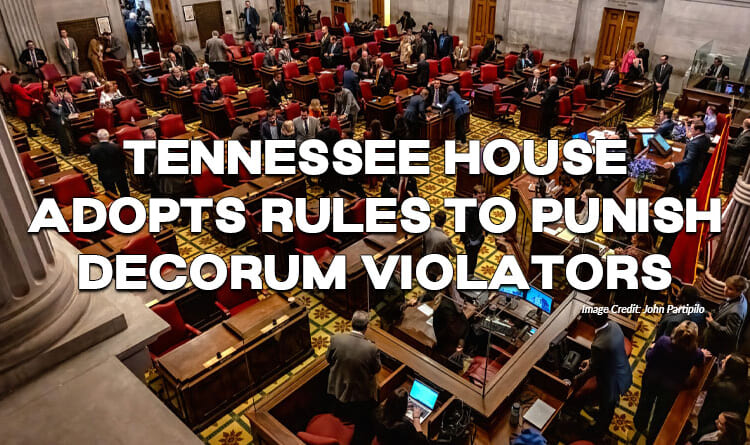House Republican created list shows Rep. Pearson spoke longer in 2023 than any other member.
Image: The Tennessee House of Representatives on the first day of the 2024 legislative session. Image Credit: John Partipilo
By Sam Stockard [Tennessee Lookout -CC BY-NC-ND 4.0] –
The House silenced one member Wednesday for disparaging Speaker Cameron Sexton and found out Democrats are dominating debate time as it adopted new rules designed to keep lawmakers from filibustering and disturbing proceedings.
House members voted 70-19 to adopt stricter rules in the second year of the 113th General Assembly, shortly after voting to shut down Rep. Justin Jones for calling Sexton “drunk with power.” The votes came a day after lawmakers found out members of the public will be restricted from chamber galleries and must present a ticket to get in.
Jones, D-Nashville, told members he witnessed one of Sexton’s security detail stop House Majority Leader William Lamberth from getting onto an elevator with the speaker Monday, then made the derogatory comment about Sexton.
Rep. John Ragan, R-Oak Ridge, immediately interrupted Jones and requested a vote to call him “to order.” After several minutes of off-the-records talks, Republicans voted overwhelmingly to skip the rest of Jones’ speaking time. He was allowed to speak at the end of the session when he read words from Joan Baez’s folk song, “Times They Are A Changing.”
The body also got a glimpse at a list of members’ speaking times and found out Democratic Rep. Justin J. Pearson of Memphis spoke for three hours, 43 minutes and 57 seconds during the 2023 session debate, nearly an hour and a half longer than anyone else.
The list was passed out by staff members of the House Republican Caucus. The Lookout has no way to verify the accuracy of it, but is choosing to publish some of its details because it provides an insight into the motivation behind the new rules.
“Voices have been silenced,” said Rep. Jason Zachary, R-Knoxville, holding up the list even though the new House rules prohibit props and presentations.
Zachary pointed out no Republican is shown on the list until the 10th spot, blaming it on members who try to “promote their own agenda.”
The speaking list
The debate time list shows Democratic Caucus Chairman John Ray Clemmons at 2 hours 16 minutes and 51 seconds, Jones at 2 hours 12 minutes and 26 seconds, Rep. Gloria Johnson at 1 hour 29 minutes and 45 seconds, Rep. G.A. Hardaway at 1 hour 20 minutes and 23 seconds and Rep. Jason Powell at 1 hour 10 minutes 3 seconds.
House Majority Leader William Lamberth is the first Republican on the list at 40 minutes 44 seconds, according to Zachary’s list, although another list for total time shows Lamberth in the top five at 2 hours 6 minutes 24 seconds.
Pearson later acknowledged speaking at length to represent his constituents in Memphis’ District 86.
But while he frequently filibusters, Democrats spend much of their energy in the House speaking to defeat bills, while Republicans who hold a supermajority don’t have to spend much time defending their legislation because they hold a 75-24 advantage.
Republicans expelled Pearson and Jones last year for leading a floor rally for gun restrictions. Johnson narrowly avoided expulsion, and Pearson and Jones returned after votes by their local councils.
The new rules give a lawmaker two strikes for being out of order or going off-topic before the House could vote to ban the member from speaking for two legislative days.
In addition, speakers will be limited to five minutes to introduce or debate a bill, and points of order and parliamentary inquiries have to be registered with the House parliamentarian who would give an immediate answer instead of being debated openly.
The rules also allow the House speaker, in talks with caucus leaders, to determine which bills could be debated for up to 60 minutes, giving each party 30 minutes to talk and allowing caucus leaders to decide who speaks. Under previous rules, each lawmaker could speak for five minutes on each bill, enabling Democrats to keep debate going for up to two hours.
In most cases, though, Republicans use a procedure known as “calling the question” to close debate and hold a vote.
The new rules also prohibit crowding around the speaker’s dais and the well where bills are presented.
While Democrats argued against the new rules, saying they would limit debate, Majority Leader Lamberth contended they would “expand debate.”

About the Author: Sam Stockard is a veteran Tennessee reporter and editor, having written for the Daily News Journal in Murfreesboro, where he served as lead editor when the paper won an award for being the state’s best Sunday newspaper two years in a row. He has led the Capitol Hill bureau for The Daily Memphian. His awards include Best Single Editorial from the Tennessee Press Association. Follow Stockard on Twitter @StockardSam












